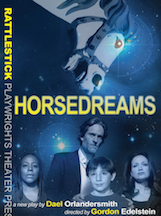HORSEDREAMS AND NIGHTMARES
A few years ago, Dael Orlandersmith made a splash with Beauty’s Daughter and Yellowman, winning an Obie Award and being a Pulitzer Finalist. Her work was largely autobiographical and involved highly poetic language, direct address, and fearless, compassionate explorations into complicated aspects of race, gender, and class. Basically, she was writing theater for educated grown-ups. Orlandersmith is also an actor who earnestly performed her own work. While her acting was never her strength, as long as the work was essentially autobiographical, it was easy enough to overlook her shortcomings as a thespian if you considered her work as morphing towards performance art. Her earlier work was a touch overwritten but full of great promise. The Rattlestick Playwrights Theater has mounted a production of Horsedreams, one of her latest plays. Unfortunately, Orlandersmith has yet to live up to the early promise.
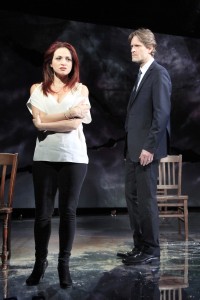 Horsedreams is the story of a privileged family ripped apart and shattered by drug addiction. After the young mother dies of an overdose and a non-privileged housekeeper is brought in to take over childcare duties, the father and son must navigate the unprocessed effects of the mother’s death. Orlandersmith’s story is told primarily in her trademark first-person direct address, each character sharing their perspectives and points of view, a style that ultimately undermines the play’s theatricality. Without the nuance of Rashoman-esque unreliable narrators, the play amounts to a non-dramatic accumulation of narrative, giving the audience the strangely non-theatrical role of passive observer. While Orlandersmith’s style actually offers an organic experience of alienation, the audience also becomes emotionally alienated in the process. The writing feels better suited for a New Yorker story than an Off-Broadway play. To his credit, director Gordon Edelstein succeeds at keeping a very static narrative moving along at a nice gait.
Horsedreams is the story of a privileged family ripped apart and shattered by drug addiction. After the young mother dies of an overdose and a non-privileged housekeeper is brought in to take over childcare duties, the father and son must navigate the unprocessed effects of the mother’s death. Orlandersmith’s story is told primarily in her trademark first-person direct address, each character sharing their perspectives and points of view, a style that ultimately undermines the play’s theatricality. Without the nuance of Rashoman-esque unreliable narrators, the play amounts to a non-dramatic accumulation of narrative, giving the audience the strangely non-theatrical role of passive observer. While Orlandersmith’s style actually offers an organic experience of alienation, the audience also becomes emotionally alienated in the process. The writing feels better suited for a New Yorker story than an Off-Broadway play. To his credit, director Gordon Edelstein succeeds at keeping a very static narrative moving along at a nice gait.
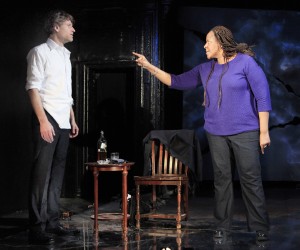 The play itself is in need of another draft to give the overall event a more mature sense of itself. Orlandersmith’s poetry relies heavily on repetition so that her words end up losing value instead of gaining clarity and articulation. The 100 minutes could easily be edited by a quarter hour. To make matters worse, much of Orlandersmith’s imagery is so on-the-nose that it ends up insulting an audience with its obviousness. Characters named Desiree, Loman, and Mira are addicted to drugs, hit bottom, and see through people, respectively. The set by Takeshi Kata further accentuates the play’s obvious imagery with a torn backdrop, a floor of shattered glass, and an immoveable line of neon cocaine, further drawing attention to the play’s heavy-handed symbolism. Then again, what would you expect from a play about the hazy impact of hard drug use called Horsedreams?
The play itself is in need of another draft to give the overall event a more mature sense of itself. Orlandersmith’s poetry relies heavily on repetition so that her words end up losing value instead of gaining clarity and articulation. The 100 minutes could easily be edited by a quarter hour. To make matters worse, much of Orlandersmith’s imagery is so on-the-nose that it ends up insulting an audience with its obviousness. Characters named Desiree, Loman, and Mira are addicted to drugs, hit bottom, and see through people, respectively. The set by Takeshi Kata further accentuates the play’s obvious imagery with a torn backdrop, a floor of shattered glass, and an immoveable line of neon cocaine, further drawing attention to the play’s heavy-handed symbolism. Then again, what would you expect from a play about the hazy impact of hard drug use called Horsedreams?
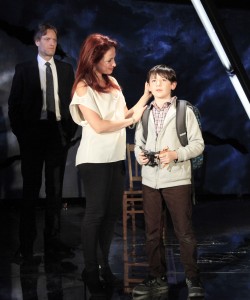 Happily, most of the performers comport themselves as well as the material will allow. Michael Laurence has the fullest character arc, and he unravels the father’s journey with a thoughtful fulcrum balancing anxiety, selfishness, and naiveté. Roxanne Hope competently orchestrates the mother’s downward spiral. Matthew Schechter, the son, is the play’s standout performance. As the most innocent, pure-hearted character in the play, he has the most to lose and the most at stake. Young Matthew Schechter sells Orlandersmith’s effusive language like a pro. Ironically, the weakest member of the cast is Dael Orlandersmith, the playwright herself, who plays Mira, the angry housekeeper. Orlandersmith’s acting choices rarely venture beyond righteous indignation, so there’s no clear added value having her in the cast. Her onstage presence feels more like post-modern stunt-casting than a necessity of the text. Having the playwright onstage in this context actually becomes a distraction, pulling the audience out of experiencing the play. She would have been wise to defer acting duties to an actor with more range and focus her energies on revising an unfinished play.
Happily, most of the performers comport themselves as well as the material will allow. Michael Laurence has the fullest character arc, and he unravels the father’s journey with a thoughtful fulcrum balancing anxiety, selfishness, and naiveté. Roxanne Hope competently orchestrates the mother’s downward spiral. Matthew Schechter, the son, is the play’s standout performance. As the most innocent, pure-hearted character in the play, he has the most to lose and the most at stake. Young Matthew Schechter sells Orlandersmith’s effusive language like a pro. Ironically, the weakest member of the cast is Dael Orlandersmith, the playwright herself, who plays Mira, the angry housekeeper. Orlandersmith’s acting choices rarely venture beyond righteous indignation, so there’s no clear added value having her in the cast. Her onstage presence feels more like post-modern stunt-casting than a necessity of the text. Having the playwright onstage in this context actually becomes a distraction, pulling the audience out of experiencing the play. She would have been wise to defer acting duties to an actor with more range and focus her energies on revising an unfinished play.
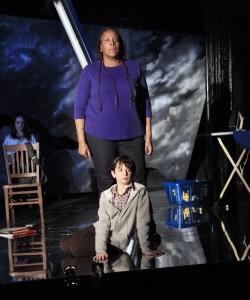 The biggest problem with a play like Horsedreams is that Orlandersmith doesn’t offer any new information on the topic of cocaine and heroin addiction. What conscious theatregoer doesn’t believe that hard drugs ruin lives? Because Orlandersmith never holds up a compassionate lens to examine the depth of the collective experience of drug addiction, an experience shared by all classes of people, the audience is left unsatisfied, sent hope without a sense of hope.
The biggest problem with a play like Horsedreams is that Orlandersmith doesn’t offer any new information on the topic of cocaine and heroin addiction. What conscious theatregoer doesn’t believe that hard drugs ruin lives? Because Orlandersmith never holds up a compassionate lens to examine the depth of the collective experience of drug addiction, an experience shared by all classes of people, the audience is left unsatisfied, sent hope without a sense of hope.
.
photos by Sandra Coudert
Horsedreams
Rattlestick Playwrights’ Theatre
scheduled to end on December 11
for tickets, visit http://www.rattlestick.org
